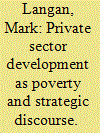| Srl | Item |
| 1 |
ID:
142791


|
|
|
|
|
| Summary/Abstract |
Since the early reform days and particularly during the Hu-Wen era, the local state has seen remarkable changes triggered by the central government's new focus on rural development and rural-urban integration. The "peasant burden" was reduced by the tax-for-fee reforms in 2002 and the abolition of the agricultural tax in 2006. Fiscal transfers were increased to provide more funding for local governments in order to ensure reasonable public goods provision as well as investment in agricultural modernization and in situ urbanization. At the same time, the performance evaluation of local cadres and government units has been streamlined to enforce stricter compliance with upper level policy guidelines and local governments have been systematically encouraged to engage in policy experimentation and innovation by linking policy success to cadre promotion. However, the local state, at all levels, is still struggling with "un(der)-funded" mandates, rising public demand and, as often reported, social protest. Against this background, this article argues that the concept of local developmentalism can still serve as a useful analytical tool to explain state-business relations at county level and below. The local state has maintained its control over private sector development and entrepreneurial agency by becoming an "interested facilitator" and "enabler" by withdrawing from its position as bureaucratic patron, cadre entrepreneur and corporate agent.
|
|
|
|
|
|
|
|
|
|
|
|
|
|
|
|
| 2 |
ID:
115236


|
|
|
|
|
| Publication |
2012.
|
| Summary/Abstract |
This paper provides a comparative analysis of the social and cultural dimensions of fish hatchery development in Vietnam and Thailand. Two detailed case studies highlight the importance of a variety of culturally mediated, informal interpersonal relationships in facilitating the establishment of new hatchery enterprises. The analysis reveals that in both Vietnam and Thailand, informal relationships are extremely effective conduits for the transfer of productive technologies from public institutions to private entrepreneurs and for the subsequent development of private enterprises. It is concluded that if current policies aimed at promoting private sector development are to be more successful, they must be better tailored to the contours of specific cultural geographies in locations where they are implemented.
|
|
|
|
|
|
|
|
|
|
|
|
|
|
|
|
| 3 |
ID:
102400


|
|
|
|
|
| Publication |
2011.
|
| Summary/Abstract |
Private sector development (PSD) has emerged as a core component of donor strategies aimed at making free markets work for 'the poor' through assistance to business sector capacity in low-income states. PSD initiatives cannot be understood, however, as technical exercises aimed solely at promoting development through business competitiveness. Instead they serve as normative concessions through which developmentally questionable market-opening has been rationalised by donors in pursuit of lucrative commercial opportunities in emerging economies. Examining the European Union's (EU) PSD framework in bilateral relations with the African, Caribbean and Pacific (ACP) states, the article examines the utilisation of PSD discourse in the 'development branding' of Economic Partnership Agreements (EPAs). PSD discourse is seen to facilitate a 'double-veiling' of asymmetric ACP-EU trade ties via legitimising images of equitable market-opening and the trickle-down of business wealth to 'the poor'. Nevertheless, the reality of reciprocal trade structures combined with Europe's anaemic PSD resources bears little resemblance to the strategic illusions of PSD. In particular, the interventions of Europe's Centre for the Development of Enterprise (CDE) in cotton and textiles sectors in East Africa are seen to have dubious outcomes for 'development' in ACP former colonies.
|
|
|
|
|
|
|
|
|
|
|
|
|
|
|
|